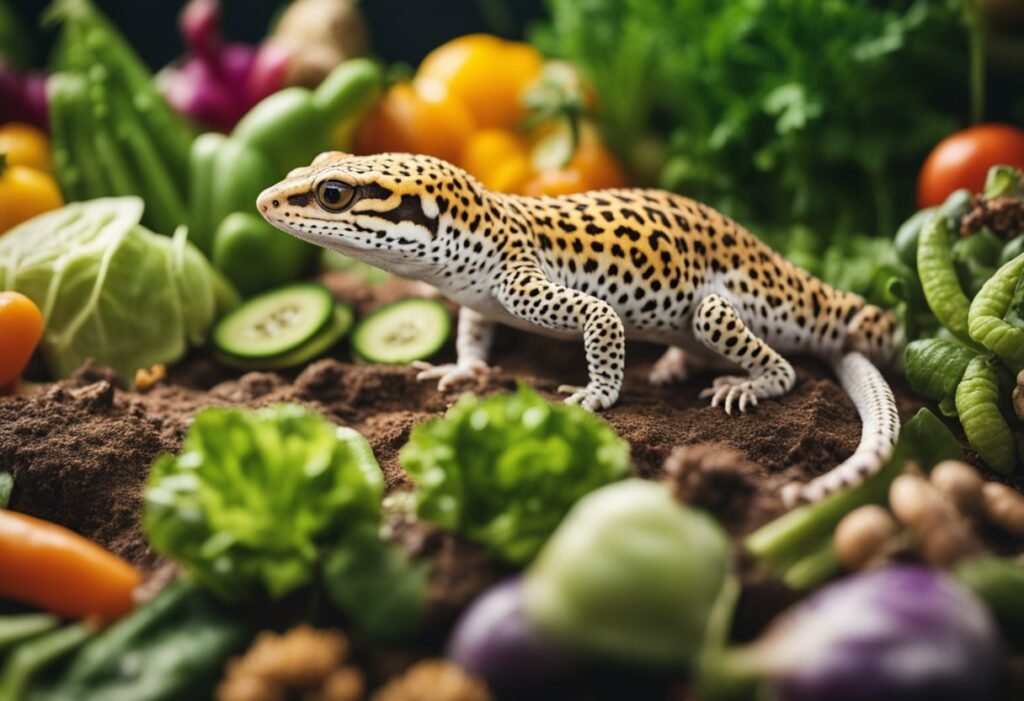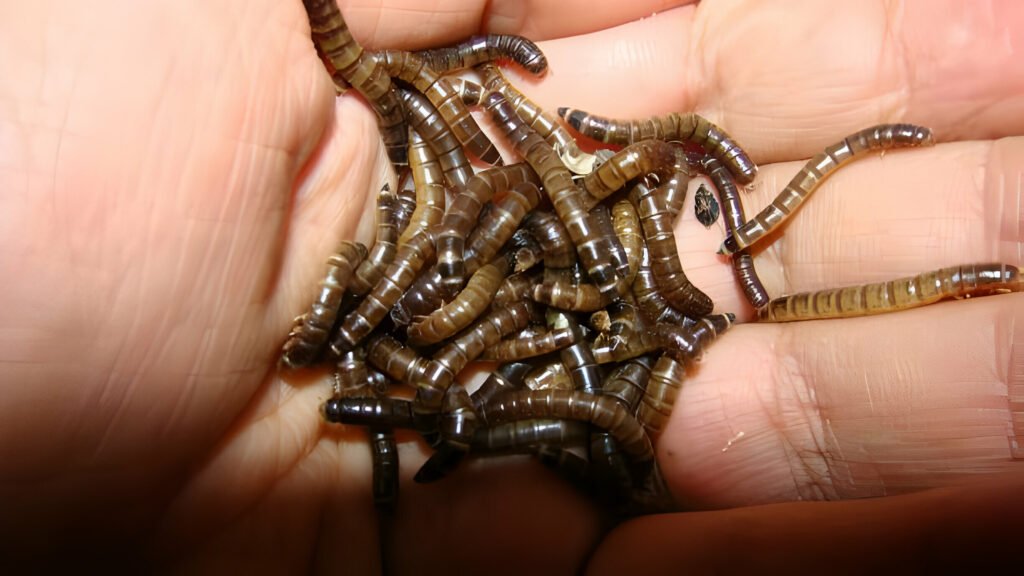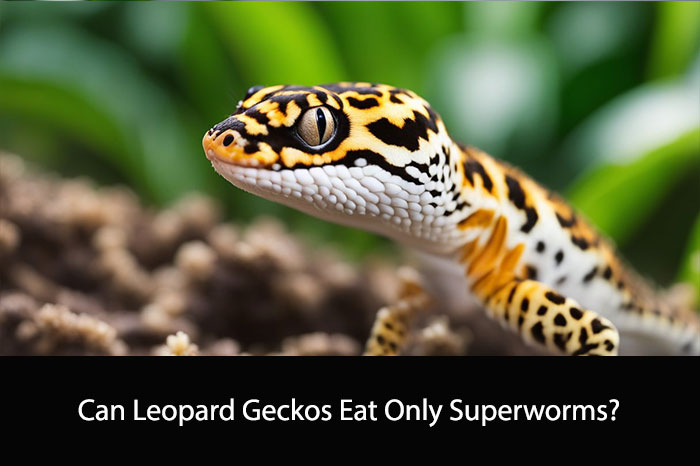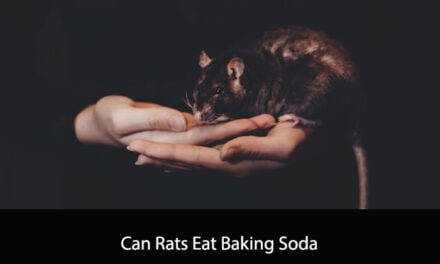Leopard geckos are popular pets among reptile enthusiasts due to their unique appearance, ease of care, and docile nature. As with any pet, it’s important to provide them with a balanced and nutritious diet. One common question that arises among leopard gecko owners is whether it’s okay for them to eat only superworms. In this article, we’ll explore the topic and provide you with the information you need to make informed decisions about your pet’s diet.

Superworms are a popular choice among leopard gecko owners due to their high protein content and relative affordability. However, it’s important to note that they should not be the sole source of nutrition for your pet. Leopard geckos require a varied diet that includes a mix of insects, such as crickets and mealworms, as well as occasional servings of fruits and vegetables. In the next section, we’ll explore the nutritional requirements of leopard geckos and why a varied diet is essential for their health.
Nutritional Requirements of Leopard Geckos

As responsible leopard gecko owners, we must ensure that our pets receive a well-balanced diet that meets their nutritional needs. In the wild, leopard geckos are opportunistic feeders, consuming a variety of insects and other small prey. In captivity, we can replicate this diet by offering a variety of insects, such as crickets, mealworms, and superworms, as well as occasional treats like waxworms and pinkie mice.
Leopard geckos require a diet that is high in protein and low in fat. Superworms are a good source of protein, but they are also high in fat. Therefore, we should not rely solely on superworms as the main food source for our leopard geckos. Instead, we should offer a variety of insects to ensure that our pets receive a balanced diet.
In addition to protein, leopard geckos require other nutrients, such as vitamins and minerals. We can provide these nutrients by dusting the insects with a calcium and vitamin D3 supplement before feeding them to our pets. It is important to use a supplement that is specifically formulated for reptiles, as other supplements may contain harmful additives.
Overall, while superworms can be a part of a leopard gecko’s diet, they should not be the only food source. By offering a variety of insects and using a reptile-specific supplement, we can ensure that our pets receive the nutrients they need to thrive.
Overview of Superworms as a Food Source

Superworms, also known as kingworms, are a popular food source for reptiles, including leopard geckos. They are a type of beetle larvae that are high in protein and relatively easy to digest, making them a nutritious option for our pets.
One of the benefits of feeding superworms to leopard geckos is that they are readily available at most pet stores and online retailers. They can be purchased in various sizes, making it easy to find the appropriate size for your gecko’s age and size.
In terms of nutrition, superworms are a good source of protein, fat, and fiber. They also contain some vitamins and minerals, such as calcium and phosphorus. However, it is important to note that they are not a complete diet and should be supplemented with other foods, such as crickets and mealworms.
When feeding superworms to leopard geckos, it is important to gut-load them with nutritious foods, such as fruits and vegetables, to ensure that they are getting the necessary nutrients. It is also recommended to dust them with calcium and vitamin supplements before feeding them to your gecko.
Overall, superworms can be a beneficial addition to a leopard gecko’s diet when fed in moderation and supplemented with other foods. As with any food source, it is important to monitor your gecko’s health and adjust their diet as needed.
Risks of a Superworm-Only Diet for Leopard Geckos

Leopard geckos are insectivores and require a varied diet to maintain their health. While superworms are a popular food choice for leopard geckos, feeding them a superworm-only diet can lead to several risks.
Nutritional Deficiencies
Superworms are high in fat and protein but lack several essential nutrients that leopard geckos need. A superworm-only diet can cause nutritional deficiencies such as calcium, vitamin D3, and vitamin A. These deficiencies can lead to metabolic bone disease, weakened immune systems, and other health issues.
Obesity and Liver Health
Feeding leopard geckos a superworm-only diet can also lead to obesity and liver health issues. Superworms are high in fat, and an excessive amount of fat in the diet can cause liver problems in leopard geckos. Obesity can also lead to other health issues such as difficulty shedding, decreased mobility, and shortened lifespan.
Impaction Risks
Superworms have a hard exoskeleton that can be difficult for leopard geckos to digest. Feeding them a superworm-only diet can increase the risk of impaction, a condition where the digestive tract becomes blocked, leading to serious health issues or even death.
In conclusion, while superworms can be a part of a leopard gecko’s diet, feeding them a superworm-only diet can lead to several risks. It’s essential to provide a varied diet that includes other insects and supplements to ensure the health and well-being of your leopard gecko.
Benefits of a Varied Diet for Leopard Geckos
When it comes to feeding leopard geckos, it is important to provide them with a varied diet to promote their overall health and wellbeing. Here are some of the benefits of a varied diet for leopard geckos:
Promoting Natural Foraging Behavior
In the wild, leopard geckos are opportunistic feeders and consume a variety of prey items. By providing them with a varied diet in captivity, we can simulate their natural foraging behavior and promote their physical and mental stimulation.
Ensuring Balanced Nutrition
Each prey item has a unique nutrient profile, and by offering a variety of prey items, we can ensure that our leopard geckos are receiving a balanced diet. Superworms, while a good source of protein, do not provide all the nutrients that leopard geckos need to thrive. By offering a variety of insects, such as crickets, mealworms, and dubia roaches, as well as occasional treats like waxworms, we can ensure that our leopard geckos are receiving a well-rounded diet.
Preventing Food Monotony
Feeding only one type of prey item, such as superworms, can lead to food monotony and may cause our leopard geckos to become picky eaters. By offering a variety of prey items, we can prevent food monotony and encourage our leopard geckos to try new things.
In conclusion, providing a varied diet for our leopard geckos is crucial for promoting their natural foraging behavior, ensuring balanced nutrition, and preventing food monotony. By offering a variety of prey items, we can help our leopard geckos thrive and live happy and healthy lives.
Supplementing Superworms in Leopard Gecko Diets
Leopard geckos are insectivores and require a varied diet to meet their nutritional needs. While superworms can be a great addition to their diet, they should not be the only food source. In this section, we will discuss important considerations for supplementing superworms in leopard gecko diets.
Calcium and Vitamin D3 Supplementation
Leopard geckos require calcium for healthy bones and muscles. Without adequate calcium, they can develop metabolic bone disease, which can lead to deformities and even death. Vitamin D3 is also important for calcium absorption and metabolism.
While superworms do contain some calcium, they have a poor calcium to phosphorus ratio. This means that feeding only superworms can lead to calcium deficiency. To prevent this, it is important to supplement their diet with calcium and vitamin D3.
There are several ways to supplement calcium and vitamin D3 in leopard gecko diets. One option is to dust their food with a calcium and vitamin D3 supplement powder. Another option is to provide a calcium supplement in their enclosure, such as a cuttlebone or calcium block.
Gut Loading Superworms
Gut loading is the process of feeding insects a nutritious diet before feeding them to your leopard gecko. This can increase the nutritional value of the insects and provide a more balanced diet for your gecko.
When gut loading superworms, it is important to feed them a nutritious diet. This can include vegetables, fruits, and commercial gut load products. It is also important to provide a source of moisture, such as a damp paper towel or water crystals.
In conclusion, while superworms can be a great addition to a leopard gecko’s diet, they should not be the only food source. Supplementing their diet with calcium and vitamin D3 and gut loading their superworms can help ensure they receive a balanced diet and meet their nutritional needs.
Alternative Insect Feeders for Leopard Geckos
Leopard geckos are known to be insectivores, which means they require a varied diet of insects to stay healthy. While superworms can be a great source of nutrition, it is not recommended to feed them to your leopard gecko exclusively. Here are some alternative insect feeders that you can add to your leopard gecko’s diet to ensure they receive a healthy and diverse range of nutrients.
Crickets
Crickets are a popular choice for leopard gecko owners as they are easily available and affordable. They are also a great source of protein and can be gut-loaded with nutritious foods to enhance their nutritional value. It is recommended to feed crickets that are no larger than the width of your leopard gecko’s head to avoid any choking hazards.
Mealworms
Mealworms are another commonly fed insect to leopard geckos. They are high in protein and fat, making them a great option for growing geckos. However, it is important to note that mealworms have a harder exoskeleton than other insects, which can be difficult for leopard geckos to digest. It is recommended to feed mealworms in moderation and to avoid feeding them exclusively.
Dubia Roaches
Dubia roaches are a great alternative to crickets and mealworms. They are high in protein and calcium, making them a nutritious option for leopard geckos. They also have a softer exoskeleton, making them easier to digest. However, they can be more expensive and harder to find than other insects.
In conclusion, while superworms can be a great addition to your leopard gecko’s diet, it is important to provide them with a diverse range of insects to ensure they receive all the nutrients they need to stay healthy. Crickets, mealworms, and Dubia roaches are all great options that can be easily incorporated into your leopard gecko’s diet.
Feeding Schedule and Portion Control for Leopard Geckos
When it comes to feeding leopard geckos, it’s important to ensure that they are getting a balanced diet that meets all their nutritional needs. While superworms can be a great source of protein for leopard geckos, it’s not recommended to feed them exclusively on superworms.
We recommend feeding leopard geckos a variety of insects, such as crickets, mealworms, and dubia roaches, in addition to superworms. This will provide a more balanced diet and prevent any nutritional deficiencies.
When it comes to portion control, it’s important to feed leopard geckos appropriately sized insects. As a general rule, the insects should be no larger than the space between the gecko’s eyes. Overfeeding can lead to obesity and other health problems, so it’s important to monitor their food intake.
We recommend feeding adult leopard geckos every other day, while juvenile geckos should be fed daily. It’s important to also provide a shallow dish of fresh water at all times.
In summary, while superworms can be a great addition to a leopard gecko’s diet, it’s important to feed them a variety of insects and ensure appropriate portion control. By following a balanced feeding schedule, you can ensure that your leopard gecko stays healthy and happy.
Frequently Asked Questions
What is a balanced diet for a leopard gecko?
A balanced diet for a leopard gecko should consist of a variety of insects. Superworms can be a part of their diet, but they should not be the only food source. Other insects such as crickets, mealworms, and hornworms can also be included.
Are superworms safe for leopard geckos to eat?
Yes, superworms are safe for leopard geckos to eat. However, they should not be the only food source as they do not provide all the necessary nutrients for a balanced diet.
How often should leopard geckos be fed superworms?
Leopard geckos can be fed superworms once or twice a week, depending on their age and size. It is important to monitor their weight and adjust their feeding schedule accordingly.
What are the risks of feeding leopard geckos only superworms?
Feeding leopard geckos only superworms can lead to nutritional deficiencies and health problems. Superworms are high in fat and do not provide all the necessary nutrients for a balanced diet. It is important to provide a variety of insects to ensure a healthy diet.
Can leopard geckos eat a variety of worms, including mealworms and hornworms?
Yes, leopard geckos can eat a variety of worms, including mealworms and hornworms. However, it is important to provide a variety of insects to ensure a balanced diet.
What should be considered when feeding nightcrawlers to leopard geckos?
Nightcrawlers can be fed to leopard geckos, but they should be cut into small pieces to prevent choking. It is important to provide a variety of insects to ensure a balanced diet.





